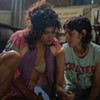Published May 2, 2007 at 4:00 a.m.
A Dutch friend once told me she liked the films of Paul Verhoeven because they presented America as it appears through her countrymen's eyes: a cartoon full of big breasts, bulging biceps and white teeth. From Basic Instinct to Starship Troopers to the camp classic Showgirls, the Dutch director has built his Hollywood career on exaggeration. Now he's returned home and turned his lens on his own nation with Black Book, an espionage drama set in the occupied Netherlands in 1944. It's a bleak setting and a serious, Oscar-bait subject - the heroine is a Jewish woman who survives by hiding her heritage and sleeping with a Nazi. Can Verhoeven resist his impulse to paint everything bigger and brighter than life?
Rachel Stein, the ex-cabaret singer played by Carice van Houten, has something in common with Verhoeven - she likes to have fun. In early scenes, we see her bop around to forbidden "English music," sunbathe in her undies, and hitch a ride on a handsome man's boat. When the farmhouse where she's been hiding is bombed, Rachel barely bats an eyelash. When her parents and brother are slaughtered in an attempt to flee the country, she looks stricken but quickly moves on. Soon she's kidding around with Resistance fighters and sharing a bed with a Hauptsturmführer in the SS (Sebastian Koch). True, she only wants information that might help free prisoners, but that doesn't stop her from developing affection for the Nazi. After all, he lost his own family in the war. And he's a big dork who collects stamps, so how evil could he be?
People forced to survive extreme circumstances develop extreme resilience, so there's a certain realism in Rachel's whatever attitude. The problem is that the movie often seems to share it. There's no scene in Black Book that's half as chilling as one second of the fascist villain's screen time in last year's Pan's Labyrinth. When that character put his revolver to the head of a wounded anti-fascist fighter, the whole audience was still. We felt his conviction that he was doing the right thing, and that was scary.
By comparison, Verhoeven's Nazis come off as slightly clownish. It doesn't help that the film's music and dialogue often sound as if they belong in an older movie version of World War II - half Casablanca, half Raiders of the Lost Ark. This is the type of film in which a villain poisons someone and then purrs, "This will put you to sleep . . . forever!"
Van Houten carries the movie with a toss of her peroxided head. That coiffure and her perfect red Cupid's bow lips are lures Rachel uses to wind bad and good guys around her little finger. While her smile charms, tension and contempt show in her eyes. Unfortunately, the only way Verhoeven finds to reveal Rachel's inner angst is to give her an occasional noisy breakdown. Defter, grittier writing and direction would have kept us in her head every step of the way.
As a rousing spy film and a mystery with twists galore, Black Book is good entertainment. The script does touch on the thorny question of the Dutch gentiles' complicity in the deaths of their Jewish compatriots. Even the Resistance fighters show some anti-Semitism - "They're all alike," one sneers, when Rachel is believed to have betrayed the cause.
Ultimately, Black Book is to World War II what the TV series "24" is to today's "war on terror." It's a glossy thrill-ride in which mass deaths are a background to personal heroism, and trauma is shrugged off or erased with a crying jag. But if the sight of van Houten topless inspires some college kid to crack a history book, Verhoeven will have achieved more than he did with all the nipples in Showgirls.
More By This Author
Speaking of Movies, movie Review
-

Next Month Brings the Final Curtain for Palace 9 Cinemas
Oct 27, 2023 -

Book Review: 'Save Me a Seat! A Life With Movies,' Rick Winston
Aug 30, 2023 -

Steve MacQueen Named Executive Director of Vermont International Film Festival
May 22, 2023 -

Vermonters Are Going Back to the Movies — Under the Stars
Aug 26, 2020 -

Where to Catch a Movie Near Burlington
Sep 11, 2018 - More »
Comments
Comments are closed.
From 2014-2020, Seven Days allowed readers to comment on all stories posted on our website. While we've appreciated the suggestions and insights, right now Seven Days is prioritizing our core mission — producing high-quality, responsible local journalism — over moderating online debates between readers.
To criticize, correct or praise our reporting, please send us a letter to the editor or send us a tip. We’ll check it out and report the results.
Online comments may return when we have better tech tools for managing them. Thanks for reading.











































